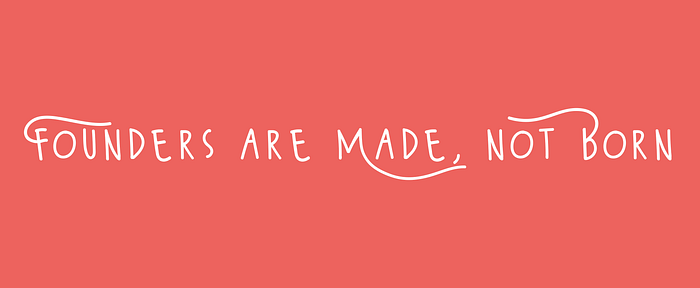#FMB: Founders are Made, not Born
This is an extension of my“Founders are Made, not Born: How Founders Become Learning Animals” series, based on my Stanford Masters of Education research. Part I, Part II, Part III, Part IV, Part V, Part VI, and Part 8 (it’s time)

Every few days I find myself on calls with exceptional people who are in-between roles and taking time to evaluate new ventures they might start (oh yes, quite the luxury). We brainstorm ideas, often in categories I’m very familiar with such as consumer, fintech or edtech, and I share broad strokes of trends I’m seeing.
When I was younger I thought you could only start a company if it was a burning passion area. While an important ingredient, passion is not always sufficient. Over time, I’ve realized many successful founders methodically chose their target markets. They chose to be a founder before they had an idea. Tope at Calendly evaluated several ideas before landing on Calendy. The DoorDash founders interviewed scores of business founders for their Startup Garage class at Stanford before landing on the concetp. And YCombinator famously takes founders who’ve worked on their idea for little time and expects several will pivot.
There is a segment of the startup ecosystem that believes entrepreneurship cannot be taught. I disagree. Are some people more natural storytellers or hustlers? Yes. Are some people more natural leaders or better at 0 to 1? Yes. Despite this, I believe many people can learn entrepreneurial skills, including evaluating and picking an idea to work on.
Here’s a few ways to choose a startup idea*:
- Choose a burning idea you can’t stop thinking about. This is often a personal problem or an area where you have an especially unique insight. Remember many successful startup journeys are 7–8 years long before exit, so even ideas that begin as burning passions may dim over time.
- Choose a problem that gives your life purpose and where you feel you can have an impact. Many mission driven founders choose to work in edtech, healthtech, and other categories where they can drive a double bottom line.
- All else equal, choose a business model or category that has a proven track record of high valuations and revenue multiples within a given category (b2b saas and marketplaces). Also consider categories that have generally produced many valuable companies (fintech). That said, don’t be afraid to go for small markets with low competition — others may not have identified the potential for you to increase the market size.
- Identify trends including current shifts in society and customer/corporate behaviors. This is especially important if you’re interested in starting a consumer-focused company. You must deeply understand your customer’s motivations and desires to the extent that you see consumer shifts happening before others. Note of caution: if this is an area that VCs are interested in investing in, that can help fundraising so you may want to check, but at the same time, beware of jumping on the bandwagon and tackling the obvious trends if you don’t have an unfair advantage. Obvious trends often have high competition. High competition makes acquiring customers and key partners more difficult.
- Choose a sector where you have unfair distribution advantages. As Reid Hoffman is fond of saying, distribution has to be part of the product strategy. So much so that you should ask what distribution channels do I have an unnatural advantage in, and then what product should I build given that?
- Choose a market where you’ll have strong “founder market fit” or “founder product fit.” This often occurs when you have past work experience alignment (many enterprise founders worked at a similar company for many years) or your life choices/passions make it an obvious choice. You’ll know it if you can weave a story that makes any listener say “well of course you had to start that company” or “I couldn’t see anyone but you launching this.”
Remember
- Make sure the problem you’re solving is a migraine not a paper cut, and that the solution is a hospital-grade painkiller cocktail, not a bandaid. Your solution has to cause enough pain for people to search for a solution and the solution has to be 10x better than status quo for people to switch
- Entrepreneurship is most risky if you’re not mentally prepared for the ups and downs and if you’re not ready to fully commit. You can’t have a plan B when you’re all in. You do need to fully believe and accept that you will land on your feet no matter what happens.
- Ideas alone do not win. The 6 points above may help you pick a better one but execution still wins over ideas. Novel, new ideas alone don’t win. It may not be their time, the team may not be right, and more often that not, someone has already tried the idea.
*Note this is not a post on how to generate ideas
A few other good articles on generating and evaluating startup ideas:
- https://spiff.com/startup-ideas-how-the-best-founders-get-them-and-why-novelty-is-overrated/
- https://www.ycombinator.com/library/8g-how-to-get-startup-ideas
- https://www.ycombinator.com/library/6e-how-to-evaluate-startup-ideas
- http://www.onstartups.com/tabid/3339/bid/64782/How-To-Pick-The-Right-Idea-For-Your-Startup.aspx
If you’re a founder working on an interesting idea, feel free as always to reach out at mbent@lsvp.com
Authors




